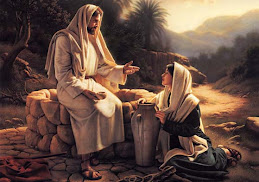"Who is among you that feareth the LORD, that obeyeth the voice of his servant, that walketh in darkness, and hath no light? let him trust in the name of the LORD, and stay upon his God" (Isaiah 50:10). In the spiritual sense, walking in darkness usually means walking in sin (Proverbs 4:19). However, according to the context of Isaiah 50:10, those who walk in darkness and have no light are those who fear the LORD and obey His voice! God's children were going through a period of darkness and suffered afflictions, trials, chastisement and testings.
When we are in our great trial, affliction, or testing. e.g. serious illness, family breakdown, bankruptcy, job losses, accidents or disasters, bereavement, oppressive opposition from the adversaries, etc, and it seems that we have no light, no strength, no hope, no directions, etc., we are encouraged to "trust in the name of the LORD, and stay upon" our God, who is our Light and Salvation (Psalm 27:1)
In all situations, we are encouraged to trust in the name of the LORD. Do we know His name? The name LORD (all letters in capital), in Hebrew, is the Tetragrammaton YHWH. The LORD or Jehovah is the covenant name of the covenant God to His covenant people. God appeared to Moses and said, "I AM THAT I AM" (EXODUS 3:14). Isaiah 42:8 says "I am the LORD:that is my name."
Reflection:I can trust in my almighty LORD even in my days of darkness. Extracted from READ PRAY GROW (april - june 2010) issue.
Monday, 26 April 2010
Saturday, 24 April 2010
Becoming Humble
 Hi dear friends, at present I am reading a book entitled "THE GIFT OF PROPHECY" by Jack Deere. In this book, he touches on the topic of humility which I would like to share with you on some insights.
Hi dear friends, at present I am reading a book entitled "THE GIFT OF PROPHECY" by Jack Deere. In this book, he touches on the topic of humility which I would like to share with you on some insights.Humility is almost always acquired in the desert. Moses, David, John the Baptist and Jesus all had significant training in the desert. The desert is necessary because no human being has the character to bear perpetual success. Jesus had the character, but His Father did not except Him from the rule. We need failure, pain and dryness to break the power of our pride. In this life, there is no cure for our pride. We are offered a daily reprieve based on the quality of our daily walk with Jesus. The desert represents that time in our lives when we seem unproductive and God seems far away. And if that weren't enough, a major test or temptation is thrown at us in the desert. The pain of the desert is where we learn that apart from Christ we can do nothing.
A second thing that helps us to grow in humility is being with humble people. It is a law of human nature that we will become like our friends (Proverbs 13:20). All of us need one to three people of the same sex who are so close to us that they know all our secrets. Why? Because if you can't talk about it, it owns you. When I share a dark secret with a close friend, 50% of the power of that darkness over me is immediately broken. James said that if we want to be healed, it is necessary to confess our sins to one another. You can only do this consistently with the closest of friends, people who would never use your secrets to betray you.
Truly deep friendships are formed without ulterior motives. Best friends are best friends for one reason: They enjoy each other. And this brings us back to our ultimate purpose in life, to love God and one another (Matthew 22:37-40)
KNOW THE TRUTH
"Give your burdens to the LORD, and he will take care of you. He will not permit the godly to slip and fall.: Psalm 55:22
"God helps those who help themselves" is an oft-heard "biblical" phrase you will have trouble finding in Scripture because it isn't there. It's just a common saying.
What does the Bible say? "Give your burdens to the LORD, and he will take care of you."
The myth that God helps those who help themselves drives us to try to do God's job. We pray, pray for change. Change in anything. Changes in our lives, our career, our children, our spouse, those nasty neighbours down the street. The list goes on and on. But nothing changes since we're the ones applying all the "fixed."
As long as we are trying to do God's job, He won't. God will stand back and wait until we stop trying to do what we've asked Him to do. Yielding to God brings marvelous results!
God will sustain you when you lean on Him. By Nancy F. Revie
"God helps those who help themselves" is an oft-heard "biblical" phrase you will have trouble finding in Scripture because it isn't there. It's just a common saying.
What does the Bible say? "Give your burdens to the LORD, and he will take care of you."
The myth that God helps those who help themselves drives us to try to do God's job. We pray, pray for change. Change in anything. Changes in our lives, our career, our children, our spouse, those nasty neighbours down the street. The list goes on and on. But nothing changes since we're the ones applying all the "fixed."
As long as we are trying to do God's job, He won't. God will stand back and wait until we stop trying to do what we've asked Him to do. Yielding to God brings marvelous results!
God will sustain you when you lean on Him. By Nancy F. Revie
Friday, 23 April 2010
Hebrews 11:1
Genuine faith puts its letter in the mailbox and lets go. Distrust, however, holds on to a corner of the envelope and then wonders why the answers never arrives. There are some letters on my desk that I wrote weeks ago, but I have yet to mail them because of my uncertainty over the address or the contents. Those letters have not done any good for me or anyone else at this point. And they never will accomplish anything until I let go of them, trusting them to the postal service.
Dr. Payson, while still a young man, once wrote to an elderly mother who was extremely worried and burdened over the condition of her son. He wrote,
You are worrying too much about him. Once you have prayed for him, as you have done, and committed him to God, you should not continue to be anxious. God's command, "Do not be anxious about anything" is unlimited, and so is the verse, "Cast all your anxiety on him". If we truly have cast our burdens upon another, can they continue to pressure us? If we carry them with us from the throne of grace, it is obvious we have not left them there. In my own life I test my prayers in this way:after committing something to God, if I can come away, like Hannah did, with no more sadness, pain, or anxiety in my heart, I see it as proof that I have prayed the prayer of faith. But if I pray and then still carry my burden, I conclude my faith was not exercised.
When we nailed our concerns, anxieties and worries upon the old rugged Cross, have we left them there or still carry them with us? Extracted from Streams of the Desert
Dr. Payson, while still a young man, once wrote to an elderly mother who was extremely worried and burdened over the condition of her son. He wrote,
You are worrying too much about him. Once you have prayed for him, as you have done, and committed him to God, you should not continue to be anxious. God's command, "Do not be anxious about anything" is unlimited, and so is the verse, "Cast all your anxiety on him". If we truly have cast our burdens upon another, can they continue to pressure us? If we carry them with us from the throne of grace, it is obvious we have not left them there. In my own life I test my prayers in this way:after committing something to God, if I can come away, like Hannah did, with no more sadness, pain, or anxiety in my heart, I see it as proof that I have prayed the prayer of faith. But if I pray and then still carry my burden, I conclude my faith was not exercised.
When we nailed our concerns, anxieties and worries upon the old rugged Cross, have we left them there or still carry them with us? Extracted from Streams of the Desert
What Are You Worth?
Mark 10:45
"For even I, the Son of Man, came here not to be served but to serve others and to give my life as a ransom for many."
My husband and I collect antiques and often argue about their value. He'll say, "This is worth five hundred dollars." And I'll reply, "It's not worth anything unless someone is willing to buy it!" Worth, just like beauty, is in the eye of the beholder.
An appraiser may place high value on an item, and a dealer may ask any price he or she chooses, but if nobody buys it, the antique is virtually worthless to the seller. Nothing is worth more than what someone's willing to pay for it.
Even your worth and mine are determined by how much someone would pay for us. There is someone who values us enough that He paid an outlandish price for our purchase. Jesus paid the ultimate price by giving His own life for ours. God values us so much that He gave up His own Son to redeem us. The Creator of the universe was willing to give His life in exchange for your. By Marsha Jordan
"For even I, the Son of Man, came here not to be served but to serve others and to give my life as a ransom for many."
My husband and I collect antiques and often argue about their value. He'll say, "This is worth five hundred dollars." And I'll reply, "It's not worth anything unless someone is willing to buy it!" Worth, just like beauty, is in the eye of the beholder.
An appraiser may place high value on an item, and a dealer may ask any price he or she chooses, but if nobody buys it, the antique is virtually worthless to the seller. Nothing is worth more than what someone's willing to pay for it.
Even your worth and mine are determined by how much someone would pay for us. There is someone who values us enough that He paid an outlandish price for our purchase. Jesus paid the ultimate price by giving His own life for ours. God values us so much that He gave up His own Son to redeem us. The Creator of the universe was willing to give His life in exchange for your. By Marsha Jordan
Wednesday, 21 April 2010
HE KNOWS THE WAY THAT I TAKE (Job 23:10)
O believer, what a glorious assurance this verse is! What confidence I have because "the way that I take" - this way of trials and tears, however winding, hidden, or tangled - "He knows"! When the "furnace is heated seven times hotter than usual" (Daniel 3:19), I can know He still lights my way. There is an almighty Guide who knows and directs my steps, whether they lead to the bitter water at the well of Marah or to the joy and refreshment of the oasis at Elim. (Exodus 15:23-27).
The way is dark to the Egyptians yet has its own pillar of cloud and fire for God's Israel. The furnace may be hot, but not only can I trust the hand that lights the fire, I can also have the assurance the fire will not consume but only refine. And when the refining process is complete, not a moment too soon or too late, "I will come forth as gold" (Job 23:10)
When I feel God is the farthest away, He is often the nearest to me. "When my spirit grows faint within me, it is you who know my way" (Psalm 142:3). Do we know of another who shines brighter than the most radiant sunlight, who meets us in our room with the first waking light, who has an infinitely tender and compassionate watchfulness over us throughout our day, and who "knows the way that we take"?
The way is dark to the Egyptians yet has its own pillar of cloud and fire for God's Israel. The furnace may be hot, but not only can I trust the hand that lights the fire, I can also have the assurance the fire will not consume but only refine. And when the refining process is complete, not a moment too soon or too late, "I will come forth as gold" (Job 23:10)
When I feel God is the farthest away, He is often the nearest to me. "When my spirit grows faint within me, it is you who know my way" (Psalm 142:3). Do we know of another who shines brighter than the most radiant sunlight, who meets us in our room with the first waking light, who has an infinitely tender and compassionate watchfulness over us throughout our day, and who "knows the way that we take"?
JESUS FEEDS THE FIVE THOUSAND
Mark 6:45
"Immediately he made his disciples get into the boat and go before him to the other side."
When someone says,"She made me do it!", he means that he did what he did not on his own accord, maybe even unwillingly, but he did it anyway against his will. If given a choice, he would prefer to do it another way or maybe not do anything at all.
So from Mark 6:45 and Matthew 14:22, when Jesus made his disciples to go away, it means that the disciples actually prefer not to go!
Imagine the scene. Their master just performed a miracle! They must be so excited about the miracle and greatly affected by Jesus' power and wanted to go along with the crowd and hail Jesus as King.
But Jesus knew what was going on inside the peoples' mind and subtly forestalled it. Therefore, He immediately (before the disciples let the wrong perception sank into their heads) commanded them to get onto the boat and row to the other side of the lake.
Reflections:1. Every word in the Bible is important as it tells us something.
2. When God make us do something, it's far better to obey immediately!
"Immediately he made his disciples get into the boat and go before him to the other side."
When someone says,"She made me do it!", he means that he did what he did not on his own accord, maybe even unwillingly, but he did it anyway against his will. If given a choice, he would prefer to do it another way or maybe not do anything at all.
So from Mark 6:45 and Matthew 14:22, when Jesus made his disciples to go away, it means that the disciples actually prefer not to go!
Imagine the scene. Their master just performed a miracle! They must be so excited about the miracle and greatly affected by Jesus' power and wanted to go along with the crowd and hail Jesus as King.
But Jesus knew what was going on inside the peoples' mind and subtly forestalled it. Therefore, He immediately (before the disciples let the wrong perception sank into their heads) commanded them to get onto the boat and row to the other side of the lake.
Reflections:1. Every word in the Bible is important as it tells us something.
2. When God make us do something, it's far better to obey immediately!
Subscribe to:
Posts (Atom)


















